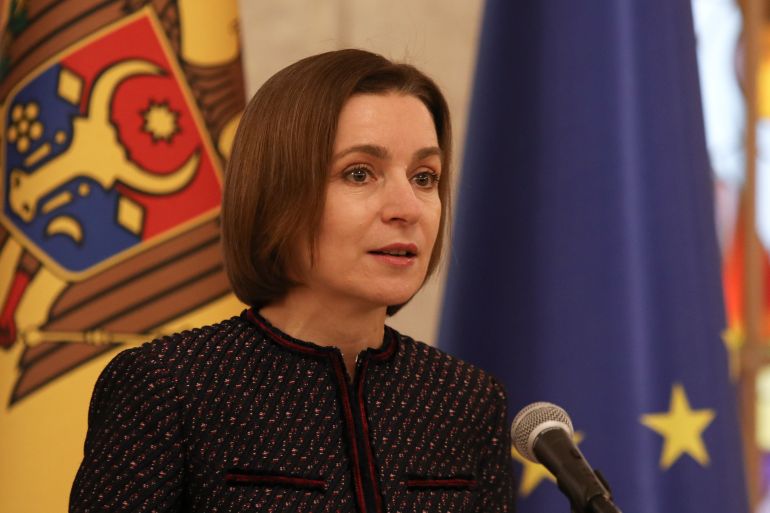What’s behind the recent flare-up between Moldova and Russia?
Moldova has accused Russia of seeking to derail its EU candidacy, as the war in Ukraine rages.

Russia-Moldova ties appear increasingly strained after President Maia Sandu blamed Moscow for plotting to overthrow her country’s government by force to derail its aspirations of joining the European Union, a claim the Kremlin has denied.
Sandwiched between Ukraine and Romania, Moldova has often been at the centre of a struggle between Moscow and the West.
Keep reading
list of 3 itemsUkraine denies withholding Russian gas meant for Moldova
Russian attacks plunge Ukraine, parts of Moldova into darkness
Since Russia’s invasion of Ukraine last February, tensions in Moldova have risen periodically, especially because of a Kremlin-backed breakaway region on its eastern border where Russia has stationed about 1,500 troops.
Here is what you need to know about the latest flare-up:
Why did the Moldovan president accuse Russia of plotting a coup?
On Monday, President Sandu accused Russia of plotting to violently overthrow the country’s pro-European leadership with the help of saboteurs disguised as anti-government protesters.
Under the guise of “protests by the so-called opposition”, the saboteurs would aim to “overthrow the constitutional order and replace the legitimate power of Chisinau with an illegitimate one”, Sandu said at a press conference.
“Kremlin’s attempts to bring violence to our country will fail,” she added.
The statement came after Ukrainian President Volodymyr Zelenskyy last week told a European Union summit that Kyiv had “intercepted the plan for the destruction of Moldova by Russian intelligence”.
Moldova, a country of 2.6 million people neighbouring Romania and Ukraine, received EU candidate status in the summer of 2022. Russia, which has troops in Moldova’s breakaway region of Transnistria, has bristled at the possibility of former Soviet republics joining the EU.
Why did Moldova close its airspace?
On Tuesday, Moldova temporarily closed its air space and Romania briefly scrambled military jets after authorities in both countries reported mysterious balloon-like objects traversing their skies.
The incidents occurred at about midday local time and briefly raised concerns in the two Eastern European countries, neither of which said where they believed the objects had come from.
The events follow a string of comparable incidents this month in the United States, in which objects detected and shot down by warplanes included a high-altitude Chinese balloon that traversed American airspace. China said it was a weather balloon that had accidentally drifted off course.
Over the past year, the war in Ukraine has repeatedly caused multiple security concerns as debris from Russian missiles landed on Moldovan territory.
In the latest incident, cruise missiles flew over Moldova and Romania as they landed in Ukraine on Friday, Kyiv’s military chief said.
What has Russia said about Moldova’s claims?
On Tuesday, Russia slapped down as “completely unfounded” the accusations that Moscow was plotting to violently overthrow the country’s pro-European leadership with the help of saboteurs.
“Such claims are completely unfounded and unsubstantiated,” the Russian foreign ministry said, accusing Ukraine of seeking to pit Moldova against Russia and accused Moldovan authorities of Russophobia.
“Unlike Western countries and Ukraine, we do not interfere in the internal affairs of Moldova and other countries of the world,” the ministry said.
“Russia does not pose a threat to the security of the Republic of Moldova,” it added, saying that “stable and friendly relations” with Russia could benefit Moldova.
For years, the Kremlin has sought to keep post-Soviet states such as Ukraine and Moldova in its sphere of influence, but both countries have pivoted to the West.
What has the US said about the claims?
Responding to Sandu’s allegations, the US voiced support for Moldovan sovereignty.
“We’re deeply concerned by reports of a plot by Russia to destabilise Moldova’s democratically elected government,” State Department spokesman Ned Price told reporters in Washington.
“Russia has a long history of malign influence both in Moldova and the region and as such we’ve worked closely with Moldova to build its political resilience and to counter long-term efforts by Russia to undermine Moldova’s democratic institutions,” he said.